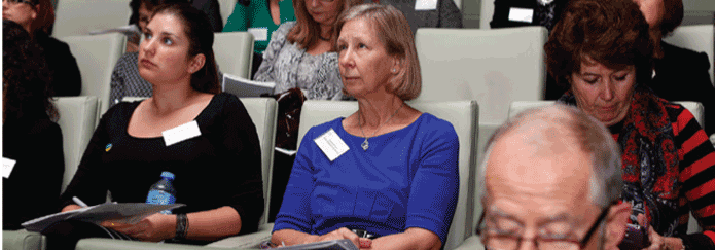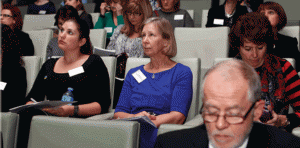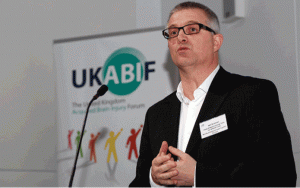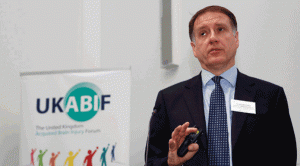
Conference details: 27 November 2014, London, UK.

Over 250 delegates attended the United Kingdom Acquired Brain Injury Forum (UKABIF) 6th Annual Conference, which took place late November last year, at the London headquarters of the Royal College of General Practitioners. The morning presentations focused on commissioning rehabilitation services and were followed in the afternoon by discussions about the issues facing people with a brain injury from both service users and family perspectives.

The diverse audience included members of the interdisciplinary rehabilitation team, case managers, personal injury lawyers, social care workers, voluntary organisations, care providers and people who have had a brain injury.
Dr John Etherington, National Clinical Director for Rehabilitation and Recovery in the Community, NHS England opened the conference by saying that the National Health Service does not focus on rehabilitation, or even consider it to be an important part of healthcare services. However, rehabilitation is everyone’s business and all health professionals need to understand that it is important – but that remains a challenge. The vision is that in 10 years, rehabilitation will be a key part of every episode of care from acute all the way through to community services. However, the current commissioning structure is an obstacle to care – for example three months is not long enough for a rehabilitation programme, so why use that disease model to commission services? Dr Etherington emphasised that the right clinical and technical training is required to deliver rehabilitation services and that intensity and a significant duration of rehabilitation treatment is essential to produce outcomes for patients.

Dr Michael Dixon addressed delegates wearing several ‘hats’, including Chair of the NHS Alliance and the first President and Senior Adviser to the new organisation ‘NHS Clinical Commissioners’, which was created to represent Clinical Commissioning Groups (CCGs) bringing together the commissioning arms of the NHS Alliance, NHS Confederation and the National Association of Primary Care. He acknowledged that the rehabilitation of people with brain injuries has been haphazard. Dr Dixon acknowledged that rehabilitation commissioning needs to be sorted and in a timely fashion. However, Dr Dixon discussed some of the problems facing CCGs such as the increased cost of health services versus real income and a shrinking budget for patients. The reality, said Dr Dixon, is that ‘not everyone’s ambitions can be fulfilled’.

An excellent model for commissioning Acquired Brain Injury services was discussed by Neil Brownlee, Head of Service/Long-term Conditions Lead, Northumberland Head Injuries Service at the Northumberland, Tyne and Wear NHS Foundation Trust. This ‘one-stop shop’ is an integrated health and social care community service for people living in Northumberland who have had a traumatic brain injury. The service provides a holistic, interdisciplinary approach and clients are seen by specialist health and social care professionals. It is a timely and efficient model and has been demonstrating excellent outcomes since it was established 22 years ago. The persons’ needs are assessed and goals agreed to maximise the person’s independence and involvement in the community. At any one time the service has between 100 and 150 service users with mild, moderate and severe traumatic brain injury.
Emma Gaudern, EMG Solicitors gave an interesting presentation on the issues and implications of the Mental Capacity Act. Emma currently acts as deputy for around 50 people and represents clients with a range of disabilities and many have significant communication problems. The Revd Dr Joanna Collicutt, Karl Jaspers Lecturer in Psychology and Spirituality, Ripon College, Oxford was thought provoking in her presentation on some of the ethical dilemmas posed by Acquired Brain Injury. Multiple impairments may be involved and they may relate to identity. What makes us who we are? How do we work out who we are? The person’s place in society may change after an Acquired Brain Injury or it can impact on memory which can be deconstructed or wiped out for large periods of time. The possibility for conflict is enormous and occurs with the past, present and future self as well as with the family, clinical team and carers.
James Piercy, science communicator and Maureen Le Marinel, past President of UNISON and current National Executive Council Member, both talked about the impact of brain injury on family members. James’s life changed dramatically in January 2011 when a serious road accident left him with a severe head injury. He was in hospital for nearly two months and whilst making a remarkable recovery, he still lives with the effects of his injury. James vividly described his recovery process in the context of him having to return to work and provide for his family. Maureen gave a moving talk about her niece, Katie who, at 12 years of age, was involved in a ‘hit and run’ accident which left her with a brain injury. Maureen outlined the need to involve the family in the rehabilitation programme and also highlighted the need for information. UNISON is currently distributing leaflets to promote the ‘Head and Brain Injury Information Signpost’, a UNISON and UKABIF joint collaboration. This web-based resource is for people with an Acquired Brain Injury, their families and all professionals involved in their care and support.
For further information, please contact: Chloë Hayward, UKABIF
T: 0845 6080788 • M: 07903 887655
E: info@ukabif.org.uk • www.ukabif.org.uk
ACNR 2014;15(1):36. Online 15/04/15